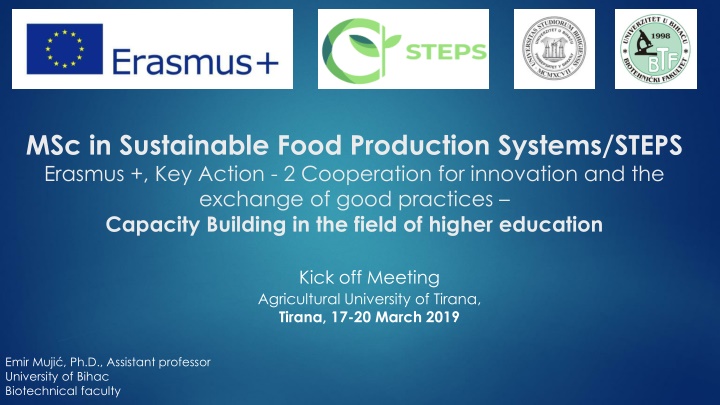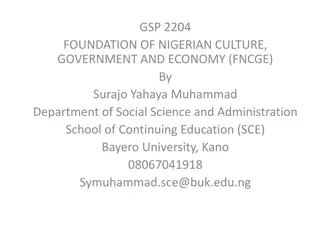
Capacity Building in Sustainable Food Production Systems
Enhance laboratories in partner countries' higher education institutions for sustainable food production through the development of ICT centers, measurement instrumentation, and advanced software tools. Two types of laboratories - Food Quality Control Lab and Food Production Systems Management Lab - will be established to improve teaching quality, scientific staff potential, and collaboration opportunities with industrial partners and research projects.
Download Presentation

Please find below an Image/Link to download the presentation.
The content on the website is provided AS IS for your information and personal use only. It may not be sold, licensed, or shared on other websites without obtaining consent from the author. If you encounter any issues during the download, it is possible that the publisher has removed the file from their server.
You are allowed to download the files provided on this website for personal or commercial use, subject to the condition that they are used lawfully. All files are the property of their respective owners.
The content on the website is provided AS IS for your information and personal use only. It may not be sold, licensed, or shared on other websites without obtaining consent from the author.
E N D
Presentation Transcript
MSc in Sustainable Food Production Systems/STEPS Erasmus +, Key Action - 2 Cooperation for innovation and the exchange of good practices Capacity Building in the field of higher education Kick off Meeting Agricultural University of Tirana, Tirana, 17-20 March 2019 Emir Muji , Ph.D., Assistant professor University of Bihac Biotechnical faculty
ERASMUS+ PROJECT STEPS MSc in Sustainable Food Production Systems Work package 5 DEVELOPMENT Title: Development of infrastructures TYPE: DEVELOPMENT LEAD ORGANIZATION: UNBI (P5) PARTICIPATING ORGANIZATION: ALL ESTIMATED START DATE 15/9/2019 ESTIMATED END DATE 15/10/2020
Related assumptions and risks The list of equipment will be verified Prepare the appropriate documentation for the equipment Accommodate and install the purchased equipment Delays due to the leakage of human resources who will attend the training seminars will be avoided
Description The aim is to build the capacity of laboratories of partner countries HEIs, in terms of: ICT-centers equipped with computers, software and relevant infrastructures. Advanced measurement instrumentation. Licenses of advanced software tools.
Two types of laboratories will be developed: The first will be the Food Quality Control Lab ; it will offer the advantage of specifying experimentally the quality of agricultural products. The second will be the Food Production Systems Management Lab it will offer the opportunity to the students to design and analyse processes and supply chains and evaluate the performance of production systems.
The equipment will be used for: improvement of the quality of teaching and the level of knowledge, and improve the potentials of the scientific staff. the opportunity to organize joint programme with industrial partners or small and medium private sector companies, national bodies. the opportunity of the involvement of HEIs in European and international research and development projects.
Educational content of the STEPS programme, for each of the experiments and simulations, training material should include: learning outcomes in experiment/simulation level, detailed description of the experiment/simulation, guidance and description of steps towards the successful implementation of the activity.
Tasks Deliverables results - outcomes Development of teaching/learning environment Developing ICT centers in all partner countries HEIs. Partner countries HEIs will validate the lists of equipment delivered to the Coordinator. Responsibility for purchasing and installing the equipment in their premises. All the documents will be available to EACEA. The whole set of devices purchased will be described in detail in a report. Disseminated by newsletters, press releases, the web-site.. 1.
2. Development of research labs The specifications of the experimental devices of the Food Quality Control Lab will be supervised by AUT, UNBI and UNSA. Scientific staff of USAMVB and ReadLab will be actively involved in the task as advisors. Regarding the Food Production Systems Management Lab, UET, UHZ, UC and UNSA will be responsible for evaluating the corresponding specifications while scientific staff of CULS and TEISTE and ReadLab will be also involved in the tasks, mainly, as advisors. Scientific staff of partner countries HEIs will assess the needs of laboratory equipment and will verify the list delivered during the preparation of the proposal After the installation, small-scale demonstrations will be provided.
3. Development of experiments/ simulations and training material Scientific staff will design laboratory and software-based exercises and projects, with the aim of exploiting at the maximum degree the purchased facilities. The progress of the tasks will be monitored based on indicators which will include, among others, the number of facilities/software licenses purchased and installed, the number of laboratory experiments and software simulations designed, the number of training/manuals developed.
Scientific staff of HEIs (and MSc attendees during the implementation of the MSc programme) will be asked about the level of satisfaction regarding the equipment installed, the number and the level at which the equipment supports the courses, its relevance with respect to modern approaches and applications.
ERASMUS+ PROJECT STEPS MSc in Sustainable Food Production Systems THANK YOU FOR YOUR ATTENTION!




